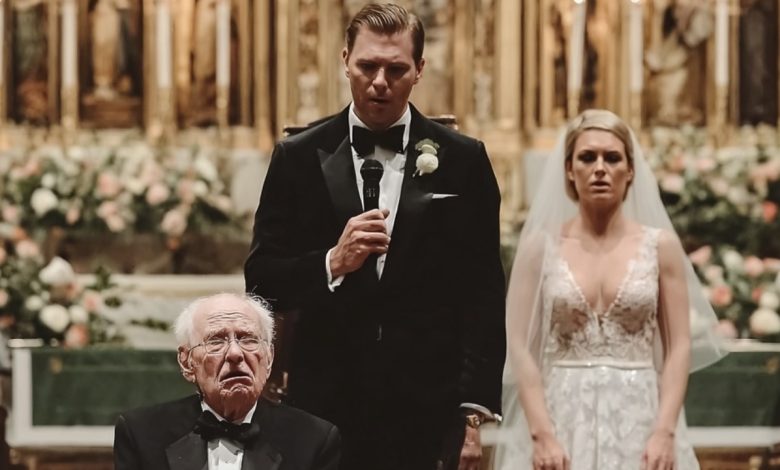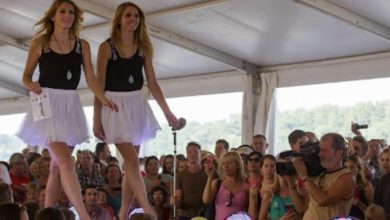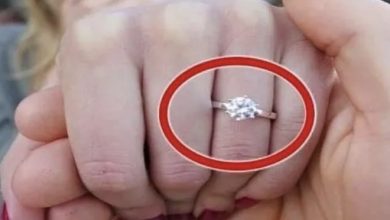The night before the wedding, my dad slept with my fiancée. I pretended everything was normal right up to the altar. But when it came time to say “I do,” my decision shocked everyone.

My name is Jonathan Clark, and I turned thirty-two convinced that honesty and trust formed the foundation of any relationship that truly mattered. I work as a senior project manager for a software company in Chicago, making a strong six-figure income and enjoying a comfortable life in my Lincoln Park condo. If you’d glanced at my calendar, my bank account, or the testimonials from my coworkers, you’d think I had everything a guy could want: a stable career, a supportive family, and a fiancée I adored. I was certain I’d found my soulmate in Meghan Davis, and I thought my relationship with my father, Robert Clark, was unbreakable. He was my hero—my guiding light—teaching me that integrity and decency were worth more than any bonus or promotion.
My dad is sixty years old and has spent more than three decades building a sterling reputation as a real estate broker in Chicago. He and my mother, Mary, have been married for thirty-five years in a union I once considered the gold standard of partnership. When I introduced Meghan to them two years ago, Dad embraced her like the daughter he’d never had, and Mom quickly fell in love with her warm, generous spirit. From the start, I felt blessed that my parents approved of the woman I planned to spend my life with.
Meghan, at thirty, is brilliant, strikingly beautiful, and works as a marketing coordinator for a well-known agency. We met at a Fourth of July barbecue—a classic suburban romance. Within months, I was head over heels. Our connection felt effortless: she laughed at my jokes, shared my love of Sunday morning coffee, and fit into my family as though she’d been a part of it forever. Mom and Dad would gush about how lucky I was, how they couldn’t imagine a more perfect match.
We set our wedding date for a cool October Saturday at St. Michael’s Church in Old Town. We booked the Chicago History Museum for the reception, sent out 150 invitations, and spent months ironing out every detail: a vintage bourbon bar, a trio of jazz musicians, custom stationery, and even a special late-night donut cart. I approached the planning like I did any work project—detailed timelines, strict budgets, contingency plans—because I wanted our wedding day to run flawlessly.
Then came the night before the ceremony. Tradition said the bride and groom shouldn’t see each other beforehand, so Mom and Meghan stayed at a different hotel. Dad and I settled into adjoining rooms at the Palmer House Hotel to rehearse the schedule one last time. We ordered room service and spread our notebooks across the little table. The afternoon was warm and bright, the city humming below us.
Halfway through a discussion about whether the jazz trio should start with “At Last” or “Fly Me to the Moon,” Dad excused himself to use the restroom. He left his iPhone unlocked on the table beside my plate. I swear I wasn’t intentionally watching his screen, but when a new message popped up, I couldn’t help but look. It was from Meghan, timestamped only minutes earlier. My stomach dropped when I read the words:
“Thank you for the most incredible night, Robert. I’m still thinking about how you kissed me. I can’t wait to do it again. You’re unbelievable. P.S. Let’s keep this between us.”
My hand went numb as I scrolled down to see a photograph attached: Meghan and my father, clearly in each other’s arms in a hotel bedroom, in an embrace that left no room for doubt. They were more than close friends; they were clearly involved. My heart froze. The woman I was supposed to marry in less than twelve hours was in bed with my own father.
In that one moment, everything I believed was shattered. The man who taught me trust and honesty had betrayed me. The woman I thought would be my partner for life had betrayed me. And my mother—likely helping Meghan prepare for our wedding right now—was oblivious to the nightmare unfolding.
My hands trembled, but my mind, honed by years of solving complex problems at work, went into overdrive. This was not an accident or a misunderstanding. The photo’s metadata proved it was taken at 11:47 p.m.—the exact time I was clinking glasses with my friends at my bachelor party. They had been together while I celebrated my future.
When Dad returned from the restroom, I had already snapped a clear picture of his screen with my own phone. I saved it, backed it up to the cloud, and closed his Messages app. I sat quietly, pretending to yawn. “I’m beat,” I told him. “I’m going to get some sleep before tomorrow.”
He clapped me on the shoulder. “Good idea, son. You’ll need all the energy you can get. Tomorrow will be the best day of your life.” His touch felt like a branding iron on my shoulder.
Alone in my room, I let the betrayal wash over me. Flashes of the past few months ran through my mind: Meghan’s sudden late-night “work calls,” Dad’s unexplained “business trips” to Milwaukee, the secretive smiles, the irresponsible compliments on a new perfume. All the little inconsistencies I’d dismissed—because I trusted them—now lined up like clues in a dark conspiracy.
They weren’t simply cheating. They planned to let me stand at the altar and vow my life to her. They wanted a public show of love as they hid their own vulgar affair. Anger roared inside me, a burning desire to confront them with shouts and tears. But my training—my project management instincts—had taken over. They expected a meltdown. I would deliver a revelation, but on my terms, in a way that spoke louder than any argument.
I spent the rest of the night constructing my strategy. In my mind, I mapped every step:
Secure the Evidence
I copied the incriminating photo and messages to a private, encrypted cloud folder. I double-checked that nothing could be deleted or altered.
Create the Reveal Tool
I used my laptop to build a simple, elegant webpage displaying the messages and photo. I generated a QR code that linked directly to that page.
Print the Invitations
In the hotel’s business center, I printed two hundred small cards. Each card featured the words:
“Scan for a wedding-day surprise”
accompanied by the QR code at the bottom.
Consult Legal Advice
At 2 a.m., I called my attorney, Rebecca Stone, who agreed to quietly attend the wedding. She told me, “Jonathan, what you’re doing is within your rights. You own the evidence, and you have every right to share the truth on your wedding day.”
By the time dawn broke, I felt unnervingly calm. I put on my tuxedo—Tailored, black, Tom Ford—and examined myself in the mirror. The reflection staring back was not a victim; it was someone ready to unleash consequences. I rehearsed my words once more, then repacked my laptop and the cards into my briefcase.
When I arrived at St. Michael’s Church later that morning, everything glittered with perfect normalcy: red-carpet runners, pews lined with white rose petals, golden light streaming through stained-glass windows. My mother welcomed me with a beaming smile; my father offered proud tears. They had no idea what was about to happen.
Meghan glided down the aisle in an exquisite white gown, breathless and radiant, her bouquet of peonies and ranunculus cradled in her arms. She mouthed, “I love you,” as she passed. My heart pounded—not with love, but with a fierce resolve.
After the vows and blessings, the ceremony concluded, and people began filing toward the reception hall entrance. My wedding planner, Janet, gave me a subtle nod and began distributing the QR code cards to the guests: one to the minister, a few to family members, then bridesmaids, groomsmen, and finally the wider congregation. I watched the ripple effect start.
Phones came out. Curiosity led to scanning. Mothers gasped. Fathers muttered prayers. My boss turned pale. Then I saw my mother’s hand shake as she scanned her card. Her eyes filled with horror as the screen revealed Meghan’s message to my father.
At that point, a hush fell over the crowd. My father, in the front row, spotted me. He tried to stand, to signal something, but the shock sealed his lips. I rose from my seat beside the altar and approached the microphone again—this time not as a groom, but as a witness to a devastating truth.
“Friends and family,” I said, voice steady and loud enough for everyone to hear. “I have discovered something no groom should ever have to face. Last night, I learned that the two people I trusted most in the world have been betraying me: my fiancée, Meghan, and my father, Robert. These messages and photos are real, and I have asked every one of you to see them for yourselves.” I paused, letting the tension build. “This ends today. Not with violence, but with truth.”
A thousand whispers swelled into cries of disbelief. I turned and walked away from the altar, leaving the chaos behind. I didn’t look back at Meghan’s tear-stained face or at my father’s ashen expression. I didn’t need to. The evidence had spoken.
I stepped into the cool October air outside the church, unshackled from the lies that had bound me. For the first time in my life, I felt free—not because I had destroyed a wedding, but because I had reclaimed my integrity. I had shown that trust was not a silent expectation but a truth earned through honesty. And as I walked away from the ruins of what was meant to be my happiest day, I wondered what I would build next—with nothing left to lose.










